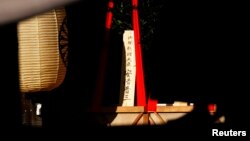Japanese Prime Minister Shinzo Abe has sent a ritual offering to a Shinto shrine that many of Japan's neighbors see as a symbol of the country's imperialist past.
On the first day of an autumn festival Friday, Abe sent a traditional potted plant to the Yasukuni Shrine, but did not visit the facility on the outskirts of Tokyo.
More than 100 Japanese lawmakers did pay their respects at the shrine, which honors 2.5 million of Japan's war dead, including several convicted war criminals from World War II.
The head of the group, Hidehisa Otsuji, defended the visit, saying it was not meant to offend.
"I believe it is a very natural thing, a matter of course, that members of parliament offer their heartfelt appreciation and prayers for those who sacrificed their lives for the country. This is what we did, and that is all there is to it," said Otsuji.
Abe visited the shrine last year, prompting outrage from China and South Korea, two of the main victims of Japanese military aggression.
He is said to be staying away from the site in hopes of arranging a meeting next month with Chinese President Xi Jinping. The two leaders have not yet met since taking office.
China's Foreign Ministry said in a statement it is "deeply concerned with and firmly opposed to the negative trend related to the Yasukuni Shrine." It said China-Japan relations can only improve when Tokyo faces up to its past.
Many Koreans and Chinese see the visits to the Shinto shrine as evidence that Abe's government is unrepentant for atrocities committed in their countries.
Separately, China and Japan are engaged in a dispute over a group of uninhabited but strategic islands in the East China Sea.
